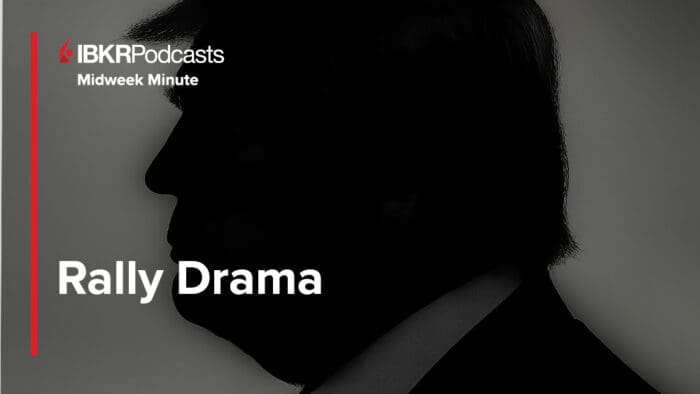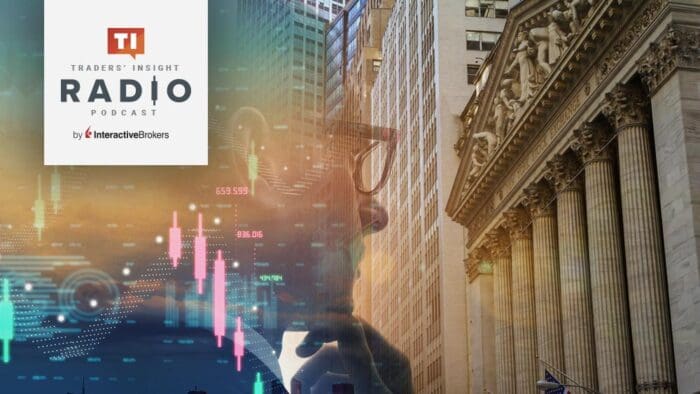Chicago-native David Eglit wasted no time out of school finding a job on one of Chicago’s trading venues. Quickly rising through the ranks at Timber Hill, David was sent to San Francisco to help establish a presence on the floor of the Pacific Exchange. In this interview David discusses his career as an equity, options and futures trader for Timber Hill and how he came to head up the frenetic Block Execution services at Interactive Brokers.
IBKR Options and Bond Desk Resources:
https://www.interactivebrokers.com/en/trading/pdfhighlights/PDF-OptionsDesk.php
optiondesk@interactivebrokers.com
bonddesk@interactivebrokers.com
Summary – Traders’ Insight Radio Ep. 27
The following is a summary of a live audio recording and may contain errors in spelling or grammar. Although IBKR has edited for clarity no material changes have been made.
Andrew Wilkinson
Welcome everybody to today’s Traders Insight Radio podcast. My name is Andrew Wilkinson, I am delighted to be joined today by David Eglit, head of US Block Trading desk here in Greenwich, CT. Welcome Dave how you doing?
David Eglit
Oh, I’m doing great Andy, thanks for having me today.
Andrew Wilkinson
It’s always interesting to get personalities from within the company. On and off, you’ve been a long-term employee with Interactive Brokers, but you initially came through the ranks at Timber Hill. Give us a sense of your timeline. When did you begin? What’s that journey been like for you Dave?
David Eglit
Yeah, that’s great. Well Andy, first thanks for having me today. I’ll try and be as insightful and entertaining as I can and start off with the background of how I even started in the business because I started in the business in 1988 with Timber Hill. Left college and started a new job at an insurance company … did that for about six months and realized I hated it. Half my friends were down on the floor of the trading.
Andrew Wilkinson
And so, you grew up in Chicago.
David Eglit
I grew up in Chicago yeah, that’s correct and so most people when they graduated high school, they either went to the training floors or they went to college. I did a little bit of both and–
Andrew Wilkinson
Was there a preference for a particular trading floor? I mean the trade everything in Chicago.
David Eglit
Yeah, you know, I think more than anything you go where your friends are and most of my friends were at the Chicago Board of Options Exchange, so it was just … it was a natural fit to go down there and visit and see the trading floor and the screaming and you know, you either hate it or you love it. And I could tell from early on that I really enjoyed it.
So, we went down there and met a couple of the people who are still with the firm. Some people who were working for Timber Hill and they gave me the opportunity to come down there. Most of the time when you go down to a trading floor, you’re given the job as a clerk. Very little income. You do what you can. You get dry cleaning lunches, things of that sort, but Timber Hill gave the option to actually have a salary and kind of a game plan as to how you’re going to eventually become a clerk to a trader and eventually move into one of the pits of your choice and to be able to trade options.
Andrew Wilkinson
What does that initial training look like, or what did it look like back then? Or, as you say in 1988?
David Eglit
So, this was 1988 and you know things are so much different than they are now. Back then anything goes anything could be said. There were regular fist fights in the pit if you know someone was being not the most up and up as far as you know, honesty and doing trades.
Andrew Wilkinson
Lacking in integrity we’ll say.
David Eglit
Lacking in integrity exactly. Which you know back then, that was kind of enjoyable. You know it was fun to be in that environment and that’s part of some of the things that would attract you to that type of the business.
Andrew Wilkinson
So how long did you spend? What did the training look like? How long did you spend doing that before you moved on to something specific?
David Eglit
Yeah, so you know when we first went down there the game plan was you started out, as a clerk. You did that for six to nine months, and then you moved into a pit of your choice, and you got to learn the ropes. You always had Timber Hill behind you, so that was kind of important because there were a lot of times where these pits were “boys clubs” where there were very few people, and they basically ran everything from who got the trades to who was determined to be first or second on the trades and you know having a firm like Timber Hill behind you, gave you an advantage. It kind of puts you in a you know… if you look at the trading floor as an ocean you were basically on a large freighter and you didn’t have to worry about blowing out or making mistakes. All you had to do was follow the Timber Hill —
Andrew Wilkinson
It gave you some gravitas.
David Eglit
It gave you some yeah, some gravitas. And it also allowed you… one of the things that Timber Hill had back then is we were in so many pits. You had the ability to go into all different types of pits. So you would solve–
Andrew Wilkinson
So just define those. These are kind of A to Z broken up into different companies.
David Eglit
Yeah, you know a pit was an area where there was a group of stocks that were traded there, and those stocks could be in all different types of industries. What was interesting is that each stock trades differently and more importantly, each pit had different traders that had different personalities and so to go in from pit to pit to pit, you had to understand how to navigate not only the how the stocks traded, but you also had to understand the personalities that you were dealing with. Some pits you wanted to be more aggressive and other pits you’d be less aggressive.
Andrew Wilkinson
And so, what sort of flow are you seeing coming into the pit as a clerk or then as a trader and what happens?
David Eglit
Yeah, so the business… it’s funny we’re talking about how the business was then and it has changed, so drastically. But back then you know the orders were… came into the phone through a booth on the floor, they would be run out to the pit with a runner, and those orders would be handed to a broker who would announce the orders and then everyone would scream. Whoever was first would get their share of the order and if you were slow or not paying attention, you didn’t participate, which is so much different than the electronic trading that we see today.
Andrew Wilkinson
So now let’s — What happens after Cboe?
David Eglit
So, one of the great things was Timber Hill gave me the opportunity to go out to San Francisco and start the Pacific Stock Exchange operation at the time. They had a small one before that had closed but we were–
Andrew Wilkinson
So was this a new exchange or at the time?
David Eglit
Yeah no, the exchange had been around. It was an equity floor, but they also had a small options floor. Back then, there weren’t as many exchanges as there were now. There were basically four and the Pacific Exchange… their expertise or their focus was on the technology sector being so close to Silicon Valley. So, they were known for the Microsoft’s, the Cisco’s the Sun Micro’s. These are stocks that were at the time up and comers. Everyone was excited about them. They were singly listed, so there was a lot of business on the Pacific Exchange that Timberhill was interested in.
Andrew Wilkinson
And they’d move as well, I guess.
David Eglit
And they would be very volatile, absolutely. You know, much more volatile than we see today. The interesting part about this was, is at the time Pacific Exchange wasn’t involved with the handhelds or electronic trading at all, and they were really — There was a lot of push back from the powers that be that they wanted to stay as an open outcry boys club and keep it “old school”, if you would. But Timber Hill at the time, we had just created these handhelds that had our markets that would come from Greenwich, and at the time it was Valhalla, but we would send the orders or the markets would come to a base station on the floor, and then they would over a wireless network, go to these handhelds. So, when we had our traders in the pit, they would have the handhelds there and that would allow the trader to be able to see what exactly they wanted to trade.
Andrew Wilkinson
So, what was the driving force to get Timber Hill on the Pacific Coast floor?
David Eglit
Well, it’s always advantageous to trade in markets where the markets are wide, they’re singly listed and there’s a lot of volume. And so, at the Pacific Exchange there was a lot of all of that. As I said, there was a lot of push back in letting this firm from the East Coast come out there with this new technology and give the ability of a trader that’s standing in the pit live updated quotes that are electronically sent. And that went on for years, and it wasn’t until one of the vice presidents of the exchange had talked to us in Chicago and said, listen, you know, we’re changing… we’re interested in your technology, we’re interested in moving in that direction, and so it was a great opportunity. I got to go out there and start the operation, bring on a nice staff. We had, you know, probably a dozen traders and half a dozen clerks and it was a great experience for me personally, yeah.
Andrew Wilkinson
And you really established it, you left it there on the map, yeah.
David Eglit
Yeah, I loved it.
Andrew Wilkinson
So now you’re not just an equity options trader, right? You’ve done other stuff.
David Eglit
Yeah, so as what happens in the trading business, you end up trading a lot of different things. When I left the Pacific Exchange, I went back to Chicago and was on the floor of the Chicago Board of Options Exchange as a sole prop. I had left Timber Hill for a little bit and at this point there were more exchanges popping up, everything was dually listed, the edge, you know, fell out of the marketplace, it was hard to make money. And so, most of the people on there kind of went to different avenues to trade. Some went to commodities, other went to futures, some went to forex. There was a group of us that went and started trading the yield curve, which is a… it’s a very simple trade. It’s basically trading the 5-year, 10-year and 30-year against each other. It’s a mean reversion trade, you don’t go home with a position. And as the trade is weak, you buy it. As it goes higher, you sell it, and you know at the end of the day you hope that you can go home flat.
That was a– It was a different experience because, you know, trading futures compared to options is a lot easier. You know it’s they either go up or they go down. You want volatility because the thing moves all over the place. And so we did that for a couple years. I went down to Florida and was a yield curve trader down there. Eventually met my wife. I knew we were going to start a family and then I reached back out to Timber Hill and Jeff Shaw, who was running the trading operations and asked him is there a spot in Chicago for me to go back to? And he said unfortunately not but if you’d like to come to the mother ship in Greenwich, you’re more than welcome. And I had to look on a map since I’d never been to the East Coast before.
Andrew Wilkinson
Was that a big shock?
David Eglit
That was a big shock. A funny story that I always tell is when I told my wife now that we were moving to Greenwich she started crying and said, “I don’t want to be a Stepford wife.” But that was a long time ago.
Andrew Wilkinson
So, funnily enough, I used to live in Wilton and Wilton is where the Stepford Wives or the author wrote about the wives in the town back in the 60s.
David Eglit
Oh, it was Wilton. It wasn’t Greenwich.
Andrew Wilkinson
No, it was Wilton. Yeah, legend has it.
David Eglit
Legend has it. So that was a great opportunity because now I come to Greenwich where it’s brand new. You know, a new area to live… I had been involved with Timber Hill for so long, but very rarely for the guys that were on the floor did we ever have the opportunity to come upstairs and see how everything was priced. We would always look at this as “is that the guys who were upstairs?” … and we would call the upstairs trading floor “the bridge” … were the ones that pulled the strings for the orders that would or the pricing that would go down to the floor. So, it was interesting to see a different side of the business. It was a great opportunity for someone who had very limited knowledge of programming and algorithms and things of that sort to see firsthand how all this operated and how Timber Hill would program a lot of the pricing that I had been seeing for years down on the trading floor.
What was a great opportunity was as Jeff at the time said “Hey listen, you know you have some experience in futures. We’ve always wanted to be involved with commodities. Would you mind starting a commodities operation for us?” So, it was a great opportunity, it was the ability to kind of delve into something that I didn’t know a lot about and learn about it on the fly. At the time, options on futures… 90% of the order flow is in the pit. Only 10% was electronic, and what that means is that the markets are wider, there’s a lot more edge. They were welcoming to electronic access via handhelds or anything else that we would want to bring down to the floor. So, we were able to have some people down on the floor able to access a lot of this order flow open outcry as well as being able to establish streaming quotes electronically to the exchange. So, this was a great opportunity. There was a lot of edge. We picked four commodities that we were interested in: gold, silver, nat. gas and crude oil.
Andrew Wilkinson
You got the big ones there.
David Eglit
Yeah, we had the big ones there, and you know the combination of trading on the floor and trading electronically. We were doing a lot of volume and in the beginning it was worthwhile.
Andrew Wilkinson
Yeah, and I think they’ve just got more and more liquid electronically over time, right?
David Eglit
And it wasn’t far. It wasn’t long after we started that a lot of the order flow did go from the pit electronically. I think it was within a couple years that the percentage of order flow had changed. It went from 90 open outcry to 10. It switched where it was 90% electronic and 10% open outcry.
Andrew Wilkinson
So, you see you you’ve earned your stripes across a lot of different markets, which puts you in a driving seat when it comes to heading up the Block Execution Desk. You’re one of the few people at this company that actually speaks to clients. I think a lot of our customers don’t actually know that. Tell us a little bit about the desk. What’s your role? Who are the clients? What do you have to do to handhold or facilitate?
David Eglit
Oh, that’s great. Thanks Andy for asking that question. And that’s what I’m most excited about now. Kevin Fisher, who is a longtime Timber Hill employee, just like I did, followed being on the trading floor and then moving up. In 2007, was asked to leave the floor and come to Greenwich and create the Block Desk. So, a lot of what we have today is due to, you know, all the work that Kevin Fisher had put together and he’s done a fantastic job in setting up the Block Desk as it is.
What I’m excited about is some of the things that we’re going to do to change the Block Desk in order to make it more visible. When I was given the opportunity to come back and manage the Block Desk, it was really… it was for one a perfect fit, but it was also very exciting. It was exciting to see a different another– Again, a different part of the business, but it was also exciting in the growth that I think the Block Desk has ability to– It’s exciting to see that there is a lot of potential for the Block Desk to grow especially as the markets change. We have a great crew at the Block Desk, the team–
Andrew Wilkinson
And you don’t just trade options there either right? There are other products too.
David Eglit
Our primary goal at the Block Desk is really to trade options and equities. We do trade futures. We don’t do a lot of that business, but options and equities are really what our focal point is. We do have the ability to trade some of the equities on the European exchanges, which seems to be gaining a little bit more interest, but really our focus Andy, is really the options and the equity side of it.
Andrew Wilkinson
So what… Why does the client get in touch with you in the first place? Why do they call you? What do you offer them that is an improvement to what somebody can do in Trader Workstation as a self-directed trader?
David Eglit
So yeah, great question. And you know, we all know that the Interactive Brokers Trading Workstation is a self-trading platform. I mean, that was what it is designed for. We want our customers to come on board with minimal personal interaction, set up the their accounts electronically, being able to manage them electronically. There’s so much available to a client with the Trader Workstation whether it’s creating algorithms, if they’re financial advisor, creating groups, being able to allocate trades across their client platforms. But there is always going to be a segment of our clients that love to be able to talk to someone, and that’s where we come in. The Block Desk gives the ability of clients to call in, for us to access their accounts real time and be able to execute trades for them.
Andrew Wilkinson
You’re a bit of a sounding board?
David Eglit
You could say that we’re a bit of a sounding board. We can put a finer touch on some of their executions. If you’re a financial advisor, you know you want to spend most of your time building your book, out talking to clients, growing your business. You don’t have time to watch your orders all day long and we have the ability to do that. If you want to call in and know what the market is doing, we have the ability to help you there. If you’re a hedge fund, maybe you don’t want to spend the additional capital in for a trader and you don’t want to sit there and watch the order execution the entire day. Well, we have the ability to do that, so you know, there is definitely a segment of the IB client base that loves to call us. We have customers or clients that call us all the time. Sometimes they just want to know what the market’s doing while they’re traveling. Other times we’re working orders for them over several days.
Andrew Wilkinson
I think something you taught me recently David was that it’s not necessarily simply dedicated to large clients.
David Eglit
That’s true Andy. We have all different types of customers. We have customers with over $100 million worth of equity and then we also have clients that have quite a bit less. I think the key to what we’re trying to do at the Block Desk is we’re trying to create relationships with some of the IB clients that need a little bit more handholding. What we’re trying to accomplish on the Block Desk is we’re trying to provide relationships, so if there are clients out there that need, maybe a little bit more handholding, they have the ability to call someone and talk to them and we can help them execute their trades.
Andrew Wilkinson
And this also extends to corporate bonds in the US as well?
David Eglit
That’s the other thing that we’re pretty excited about. So, Joe Burke was fantastic to work with. I’ve worked with him for over a dozen years. He’s been in charge of the bond trading side of things for a while. He’s doing great things in expanding the corporate bond business and in fact we just recently hired someone to help him on who has a lot of experience with the Latin American sector, and I guess we’re really excited.
Andrew Wilkinson
Well, that’s pretty timely with what’s happening with the Fed too.
David Eglit
Absolutely, you know, as we’re seeing interest rates rise, there’s definitely more interest in corporate bond trading. And we can see that already with the amount of phone calls we’re receiving.
Andrew Wilkinson
David, what can you tell us about the client psychology during the bearish first half of 2022? You must see fear and greed all the time.
David Eglit
Yeah, you know it’s definitely been a challenging time for IB clients.
Andrew Wilkinson
It’s good for some of them.
David Eglit
Good for some.
Andrew Wilkinson
People like to trade volatility.
David Eglit
Some do like to trade volatility, but in general I think when the market gets very volatile and has a downturn in general, we see less business. People are less speculative, and they’re more interested in capital preservation than appreciation.
Andrew Wilkinson
What’s your favorite trading story Dave? Do you have a meaningful client story that others can learn from?
David Eglit
You know, I … you talk about trading stories, there’s just one that really resonates with me and it’s when I first started in the business, and it was one of the first times must have been only trading for a year or so and we were in an equity pit and I came in and there was a stock that was down 50%. And you know, the pit dynamics is really interesting because you sit around and for all the times that things aren’t trading, you really get to know the guys that are around you. Funny story, there was a guy who was around me sat– literally stood next to me for two years and his badge was MZU, so I used to call him Mizzou. He went to Missouri, University of Missouri and his wife called one time and said “Is Jeff there? And I’m like “there’s no Jeff here” and he’s like “wait, my name is Jeff” and I said, “I had no idea your name was Jeff.”
But the story that I could think of is you know you– So my point being is that you get to… as much as you get to know everyone on a personal basis how much do you really know about them? But we came in one day, the stock was down 50% and there was a gentleman who was, you know, he must have been 60 years old or so had been on the floor for 20 years and he looked at me with tears in his eyes and said, I’m out of business and to hear someone say that you know it was… I didn’t know what that really meant. I mean, well, what does that mean you’re out of business? You’ll get some more capital and be here and he’s like “no, I’m finished, I’m done.” And so that was the first realization that this isn’t just games. This is real money, and this is real lives, and it was–
Andrew Wilkinson
It’s where fortunes are made and lost.
David Eglit
It really is and that story still resonates with me.
Andrew Wilkinson
I don’t want to end it on that, it’s very sad.
David Eglit
Yeah, I didn’t either.
Andrew Wilkinson
Many clients probably don’t know about you or the Block Trading Desk. How can someone contact the team?
David Eglit
A great question, Andy and it’s definitely something I wanted to end with. If anyone is interested in knowing more about the Block Desk or how we might be able to help their business, they can go on to the IBKR website. In the trading section, we just rebranded our brochure. All the information as far as our minimums and what we could provide, whether you’re a financial advisor or a hedge fund out there. We’re more than willing to take a phone call and let and see if there’s a way that we might be able to help your business. One thing that I really want clients to understand, not just clients, but some of the sales staff is that you have an asset in the Block Desk with over 50 years combined experience between the five of us. So, you have the ability to access… it’s another tool in your repertoire on how to promote IBKR and IBKR trading. And if you are ever interested in hearing more about us, by all means, feel free to reach out.
Andrew Wilkinson
And if you want to reach out by e-mail, you can contact David on optiondesk@interactivebrokers.com or for Joe Burke, reach him at bonddesk@interactivebrokers.com. David Eglit, thank you for being a splendid guest today. It’s always great to go back in time with people, particularly those around us within the company, and you’ve come from that great place, Timber Hill. So, it’s always good to make contact with people from there.
David Eglit
Andy, thanks for having me. I hope I gave you enough information to be entertaining as well as informative. It was a pleasure spending some time with you.
Andrew Wilkinson
You’re very welcome. Thank you very much, David, and thanks to the audience. Don’t forget folks you can find more market color at tradersinsight.news. We’ll see you next time.
Disclosure: Interactive Brokers
The analysis in this material is provided for information only and is not and should not be construed as an offer to sell or the solicitation of an offer to buy any security. To the extent that this material discusses general market activity, industry or sector trends or other broad-based economic or political conditions, it should not be construed as research or investment advice. To the extent that it includes references to specific securities, commodities, currencies, or other instruments, those references do not constitute a recommendation by IBKR to buy, sell or hold such investments. This material does not and is not intended to take into account the particular financial conditions, investment objectives or requirements of individual customers. Before acting on this material, you should consider whether it is suitable for your particular circumstances and, as necessary, seek professional advice.
The views and opinions expressed herein are those of the author and do not necessarily reflect the views of Interactive Brokers, its affiliates, or its employees.
Disclosure: Order Types / TWS
The order types available through Interactive Brokers LLC's Trader Workstation are designed to help you limit your loss and/or lock in a profit. Market conditions and other factors may affect execution. In general, orders guarantee a fill or guarantee a price, but not both. In extreme market conditions, an order may either be executed at a different price than anticipated or may not be filled in the marketplace.
Disclosure: Options Trading
Options involve risk and are not suitable for all investors. For information on the uses and risks of options, you can obtain a copy of the Options Clearing Corporation risk disclosure document titled Characteristics and Risks of Standardized Options by going to the following link ibkr.com/occ. Multiple leg strategies, including spreads, will incur multiple transaction costs.
Disclosure: Futures Trading
Futures are not suitable for all investors. The amount you may lose may be greater than your initial investment. Before trading futures, please read the CFTC Risk Disclosure. A copy and additional information are available at ibkr.com.















Join The Conversation
For specific platform feedback and suggestions, please submit it directly to our team using these instructions.
If you have an account-specific question or concern, please reach out to Client Services.
We encourage you to look through our FAQs before posting. Your question may already be covered!